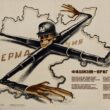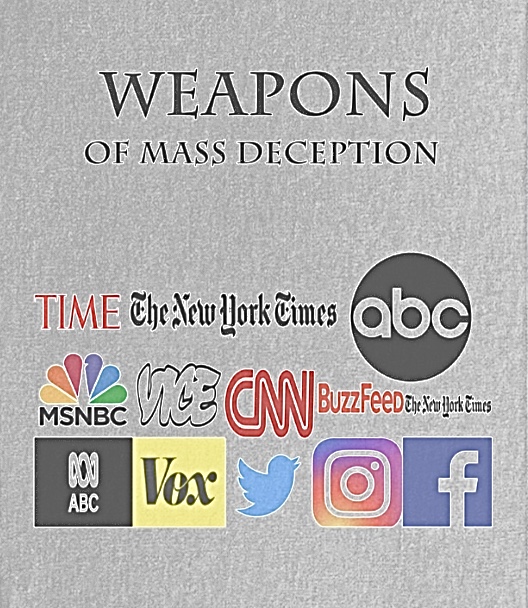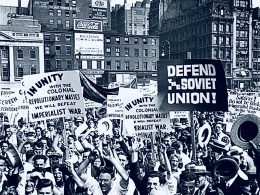There is an objective the imperialist narrative managers are presently advancing that’s crucial for the continued functioning of the war machine, and by extension the survival of the bourgeois state. This objective is to dissuade radicals in the imperial center from taking an anti-imperialist stance. As the upcoming Rage Against the War Machine demonstration reintroduces the Ukraine debate, after Russia’s victories in the last half-year have made the Democrats try not to focus so much on Ukraine anymore, it’s vital for these radicals to not be swayed towards participating in this rising anti-imperialist struggle. This great threat to American militarism, which has appeared at a point where the imperial structure is more vulnerable than ever, must be stopped from getting too powerful.
The way to do this is by convincing those who care about anti-fascism, anti-imperialism, and anti-capitalism that the geopolitical bloc which the empire is waging war against represents merely another iteration of these things. If the joint project of China and Russia to dismantle U.S. hegemony is seen as nothing more than an effort to replicate the evils of the U.S. empire, then apathy becomes seen as the correct response towards this project’s growing success. There appears to be no reason to care about anti-imperialism, a mentality which naturally surrenders the rhetorical sphere to imperialism’s propagandists. Combating the psyops used to justify the cold war maneuvers, and thereby combating the most useful narrative weapons the state uses to maintain its social control, is viewed as not worthwhile.
This dynamic of apathy towards geopolitical analysis, so prevalent within today’s American left, is self-reinforcing. As one can’t be motivated to combat imperialist psyops when they aren’t even aware that they’re psyops. The psyop about Russia, China, and Iran carrying out their own imperial projects is easy enough to repudiate. To disprove it, you only need to properly understand the definition of imperialism, and see that these countries don’t meet the criteria for this definition. The lies that require deeper investigation, and more complex counter-arguments, are the ones which involve concocting grand, elaborate narratives about malign activities these countries have supposedly been involved in. The “Xinjiang genocide” is one example, as are the fabricated accounts of Iranian mass executions.
The purpose of these kinds of deceptions is to make it look on the surface like there’s evidence that these countries aren’t worth standing with on even a critical level. In this reality the imperialists have invented, Washington’s challengers are without exception as morally reprehensible as the Taliban, or the Erdogan government. There’s no nuance in this way of thinking, only total demonization of every global force that’s challenging U.S. imperialism.
The way that this strategy of encouraging false equivalencies aids the Ukraine psyop’s influence over radicals is by cultivating the perception that the war has no good side. That both Ukraine and Russia are fascist states, so backing Russia isn’t worthwhile. Since a Marxist analysis of what fascism is can easily refute this notion, which broadens the definition of “fascism” to an absurd degree by portraying Russia as such, the imperialists have had to craft a story about the Russian government doing things which fit the criteria for fascism. Things like aiding a paramilitary group that advances neo-Nazism, which if true would make it guilty of the same evils Ukraine has carried out since the Euromaidan coup. Without this narrative, the “Russia is fascist” argument would be too transparent in its manipulative nature, as by such a broad standard every bourgeois state could be considered fascist. The imperialists have needed to conjure up a Russian fascist menace, and that supposed menace is called Wagner.
Since I started researching Wagner, I’ve found out problems with the story we’ve been told that are both incredible, and wholly unsurprising:
-On page 12 of its 2020 report on Wagner, the NATO propaganda outlet Bellingcat admits that Wagner has no ties to the Rus Fed military. Bellingcat puts this admission inside of an accusatory statement, saying about the Russian black ops innovator Yevgeny Prigozhin: “Whether or not the ‘Wagner Group’ was the brainchild of the Russian military establishment or of Prigozhin himself, multiple digital breadcrumbs corroborate the linkage between his operations and the private military company.” This means even Bellingcat, which at times has lied to make its cases against NATO’s geopolitical targets appear stronger, isn’t bold enough to make the claim that the Russian military created “Wagner.” The evidence for this idea is that spurious. As I’ll explain, this is a hint of a deeper deception regarding Wagner.
-In an interview with Scott Ritter, a commander of the Donbass anti-fascist separatist movement’s Vostok battalion has explained that “Wagner” is not actually an organization, but rather a name that Russian mercenaries started calling themselves after the Special Operation began. Which explains why Bellingcat couldn’t find any ties between the military and a specific entity called Wagner. Only ties between the government and disparate mercenaries, who the imperialist media portrays as being part of one big group. The lie the media has sold us about the nature of “Wagner” is analogous to if you were to say that every American political party which identifies with the “patriot” label is part of a singular party, called the “Patriot Party.” These actors are a disparate series of mercenaries who share the same memetic “Wagner” idea, not the same organizational membership. This misleading portrayal of what Wagner is has the purpose of making Russia’s mercenaries appear to be a cohesive, unified bogeyman. Which, as I’ll cover, they’re made out to be whether or not they’ve truly gotten involved in a given warfare situation.
-In that same report, Bellingcat includes a statement which confirms that the famous Dmitry Utkin who’s been tied to Russian mercenary activity is not the same Utkin whose (supposed) Nazi tattoo photo has been widely shared by pro-NATO propagandists on social media. Bellingcat states about Prigozhin’s catering company Concord, whose CEO’s name was also Dmitry Utkin: “the Dmitry Valeryevich Utkin in fact appointed as CEO was not the Wagner Group commander. In fact, this Dmitry Utkin was created just a month earlier – through a legal name change (permissible in Russia) of a little-known St. Petersburg resident, eighteen years younger than the original Utkin and having only three months of prior management experience running his own startup company: Alexey Karnaukhov.” Karnaukhov is the alleged neo-Nazi who these propagandists claim is a mercenary commander. In reality, he’s nothing more than a business partner of Prigozhin, a business partner whose role is wholly detached from mercenary activities. And because he looks vaguely similar to the shirtless, scowling man with Nazi tattoos on his shoulders who’s appeared in a viral photo, the Ukrainian disinformation agents have falsely claimed he’s the same person as this man.
-In addition to spinning what’s in effect a conspiracy theory about Wagner existing in the way they claim it does, and about “Wagner” including Nazi commanders, NATO’s propagandists have tried to link “Wagner” to war crimes that have had unproven links to the Russian side, and good evidence of being Ukrainian false flags. The media has described “Wagner” as the perpetrator of the Bucha massacre, but the question of who was behind the massacre has infamously been a topic of dispute. Dispute which the pro-NATO side has only been able to respond to by censoring those who’ve challenged the official narrative. The Russian side is ironically the one which has put in extraordinary efforts to adhere to the “international law” which liberals care so much about, declining to extrajudicially take the lives of even the murderous Nazis it’s taken as war prisoners. Whereas Russia has been confident enough to accuse Ukraine of executing war prisoners, the imperialist media hasn’t so far been confident enough to try to turn those charges around at Russia.
And as Ritter has pointed out, there’s much precedent for the Ukrainian side using the cleansing of entire communities as a warfare tactic. Bucha showed that Ukraine at times massacres non-combatants not to terrorize its enemies, but to pin the blame for the deaths on its enemies. (Assuming this false flag was even pre-planned; Ukraine could have committed an atrocity that it regretted, then to cover up the mistake they said Russia was behind it.) The imperialist media’s mythologized version of “Wagner,” because it’s so ill-defined and therefore so easy to make unsubstantiated assertions about, was the perfect culprit.
Do these facts refute that there are fascists inside or adjacent to Russia’s governmental and business institutions? They don’t, and I’ve been bringing up for a while now that fascists indeed hold such types of status within Russia. The context NATO’s partisans leave out when they talk about this is that since the war began a year ago, these fascists have become marginalized compared to their previous level of influence. Which is shown by how the fascists within the story I’ve just told are not military or paramilitary commanders, and haven’t gained any additional influence due to the conflict. The opposite has been the case, because Operation Z was started largely through an eight-year-effort by Russia’s communists to pressure Putin into taking action against imperialism and Ukrainian fascism.
The role that anti-imperialists should take within our discourse is not a timid, paralyzed state of constant rhetorical concessions, where we’re afraid to challenge the Ukraine psyop out of fear of our opposition’s argumentative power. Our opponents have no honest argument, because they’re arguing in favor of imperialism and Nazism. We must combat the Ukraine psyop and the other imperialist psyops unapologetically, or pro-imperialist ideology will continue to hold crippling influence over our radical spaces.
The view we should hold on the character of the Russian state is not “this state also has serious problems, so we should support neither Ukraine nor Russia.” It’s “like most states, the Russian state has serious problems…does this take away the practical need for Russia to rescue the Donbass from Ukraine’s ethnic cleansing threat, and to advance the decline of U.S. hegemony?” Z was the only way to realize these goals, therefore communists should support it. It’s absolutely possible to reconcile opposing Russia’s bourgeois state with supporting this specific decision of it, which was made according to the will of Russia’s communists. The actors who try to obfuscate this by calling Russia fascist rely on stories that lack sufficient substantiation.
—————————————————————————
If you appreciate my work, I hope you become a one-time or regular donor to my Patreon account. Like most of us, I’m feeling the economic pinch during late-stage capitalism, and I need money to keep fighting for a new system that works for all of us. Go to my Patreon here.








